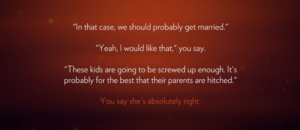
Good mechanics for storytelling are simple, but flexible. In Firewatch, the central mechanic is the interactions with the walkie-talkie, which create a simple repeatable loop that offers many different opportunities for story beats.
Firewatch is a hit walking simulator made by indie game company Campo Santo released in 2016. I played it on my PC, though it’s also available for Mac and a range of consoles. Its story is fairly emotionally heavy and it features a range of mildly sexual themes and profanity, so it seems appropriate for a 16+ audience. The game is close to a pure walking simulator; besides its story and art style, its most unique iteration on the genre is that the story is told mostly audibly through a walkie-talkie that the player carries around while exploring the game world. In the tradition of walking simulators, it relies equally on narrative, sensation, and discovery types of fun.

Firewatch’s map is surprisingly realistic. You’re expected to navigate the park using only the map and a compass.
Some lessons about walking simulators I learned from Firewatch:
– Break up the monotony of a walking simulator by making everything interactable. It helps immersion immensely to have everything elicit a reaction from Henry or Delilah. I was pleasantly surprised when even examining some beer cans had a short dialogue blurb attached to them. It’s especially nice when these interactions are optional, i.e. they aren’t essential to advancing the story but offer a bit of detail that feels like a reward for being curious.
– With regards to the exploration in walking simulators: players are smart, and letting them struggle a little bit to figure out a solution isn’t bad. My gameplay highlights were moments when the game let me figure out a solution myself. For example, the first task is to navigate to a supply box, and the game only hands you a map and a compass. Navigating was a bit frustrating, but ultimately it felt good to figure things out without the game holding my hand. As a designer, I might be alarmed at the first signs of a player experiencing frustration. This is a note to self to be able to tolerate some frustration during playtesting.
– Story-based games should center humans. Firewatch relies on narrative fun almost exclusively, and its narrative was made strongest by 1) the emotional tug of Henry/Julia’s love story and 2) the interactions with Delilah.
– Good mechanics for storytelling are simple, but flexible. In Firewatch, the central mechanic is the interactions with the walkie-talkie, which create a simple repeatable loop that offers many different opportunities for story beats.

Laura Hall wouldn’t like this.
Some things I would change:
– The story is introduced through expositional text, which is antithetical to Laura Hall’s advice that games’ stories should be told as much as possible through the environment and mechanics since players don’t want to read. Personally, I didn’t mind the text, though I thought I should note it.
– I’m lukewarm on playing a story game where the player is handed an identity (in Firewatch’s case, we play as Henry). I understand how it’s necessary for a deeply scripted story like Firewatch’s, but I did feel a bit like the game wasn’t made for me. I think I prefer games where the player’s identity is ambiguous, so players can feel more immersed in their in-game avatar.
For all my obsession with mechanics and game loops and reward systems, it is refreshing to be reminded that games can be just plain beautiful as well.
For project two, my team is making a game that’s close to a walking simulator, or perhaps more generally an “empathy game” (in the words of our assigned reading). It’s shaping up to be a primarily narrative experience with fewer (if any) gameplay elements; that is, through our discussions, I’ve found the game moving away from the expression of skill and more towards pure storytelling. I’d be lying if I said this didn’t still worry me (I tend towards being gameplay-forward) but after having experienced Firewatch, I’m more open to seeing that games can offer value that’s undefinable in the realm of traditionally game-like elements. For all my obsession with mechanics and game loops and reward systems, it is refreshing to be reminded that games can be just plain beautiful as well.



